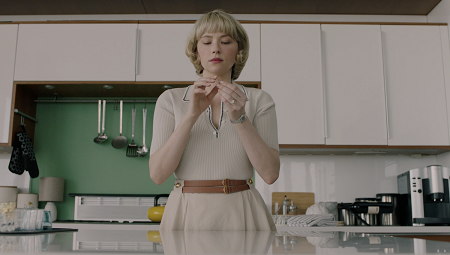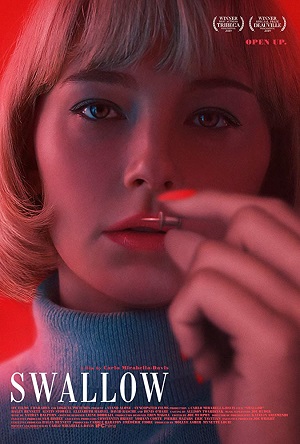
“Swallow” – Interview with Carlo Mirabella-Davis
by Sara Michelle Fetters - March 6th, 2020 - Interviews
Hidden in the Unconscious Mind
Digesting Swallow with writer/director Carlo Mirabella-Davis
I went in cold to The Swell Season documentarian Carlo Mirabella-Davis’ first feature-length narrative film Swallow, and to say I was unprepared for the resulting emotional maelstrom he so confidently crafted would be a massive understatement. The story of Hunter (Haley Bennett), a young newlywed struggling to come to grips with her new carefully constructed prim and proper life after marrying the wealthy Richie Conrad (Austin Stowell), this meticulously crafted drama knocked my socks off.

Featuring a stunning lead performance from Bennett, the movie deals with a multitude of themes involving wealth inequality, patriarchal relationships and rigidly constructed social mores where appearance and presentation are more important than almost anything else. There is also an added element of Hunter developing a psychological medical condition known as “Pica,” a disorder where people ingest items normally considered as inedible.
But there’s far more than that going on here, Mirabella-Davis constructing a fiercely determined scenario of self-discovery and individual empowerment that goes into several surprisingly unexpected directions as it builds to is purposefully explosive climax sure to spark more than its fair share of controversy. I had the pleasure to spend a few minutes speaking with the writer/director about Swallow. Here are some edited excerpts from our far too brief conversation:
Sara Michelle Fetters: I read that you were inspired by your grandmother when you sat down to write Swallow. Talk to me about the process of making this a sort of a love letter to her, but also modifying things so that this story feels current and of this actual moment.
Carlo Mirabella-Davis: The film was, as you say, inspired by my grandmother. She was a homemaker in the 1950s in an unhappy marriage who developed various rituals of control. She was an obsessive hand-washer who would go through four bars of soap a day and 12 bottles of rubbing alcohol a week.
I think she was looking for order in a life she felt increasingly powerless in. My grandfather and the doctors put her into a mental institution where she received electroshock therapy, insulin shock therapy and a non-consensual lobotomy. I always felt that there was something punitive there, that she was being punished for not living up to society’s expectations of what they felt a wife or a mother should be.
As I began making Swallow, we gave the film a bit of a retro feel, to have a kind of 1950s vibe to it in the beginning in order to reflect the idea that, even though we like to think that a lot of the old guard patriarchy from that time has vanished, which thankfully a lot of it has, that it’s still lurking underneath the surface in our current era. In fact, it’s making a horrifying resurgence with the advent of the Trump administration. Luckily, there are a lot of amazing new voices fighting against that, so that’s good.
But I still wanted to sort of call back to that feeling. My grandmother’s story is very powerful, impactful and speaks to a lot of things that are going on currently. As the film progresses, as it becomes more and more realistic in terms of styles that reflect Hunter’s growing psychological state of mind, I wanted that change to become more and more apparent to the audience.
Sara Michelle Fetters: And at what point did you incorporate Pica into this story? How much research did you have to do?
Carlo Mirabella-Davis: As I was adapting my grandmother’s story, I realized that hand-washing is not very cinematic. I remembered seeing a photograph on the internet of all the contents of someone’s stomach who had Pica, all these objects that had been surgically removed and laid out on a table, almost like an archeological dig. I was fascinated. I wanted to know more. It almost seemed like something mystical, like a kind of holy communion. I wanted to know what drew the patient to those objects.
That’s how that began. I reached out to the world’s expert on Pica, Dr. Rachel Bryant-Waugh, who actually wrote a case study of Hunter as if she was her patient, which was a very interesting document, and much of which found its way into the script. I was very excited that she became a consultant on the film.
Sara Michelle Fetters: I love that you bring up how the movie sort of starts in almost a retro glossy old-Hollywood style and then subtly changes throughout. One of the things that I noticed, but early on, when I’m watching Hunter, I kept feeling like she had transformed herself into this sort of porcelain doll. And, not only that, but the house that she found herself in was this sort of glass display case. Am I reading too much into all of this?

Carlo Mirabella-Davis: No! Not at all. I’ve used those exact words about the glass display case. I’m so pleased with your interpretation. It’s exactly what I was going for, the idea is that she’s in this kind of diorama, like in the Natural History Museum.
The glass also serves as a kind of metaphor for this invisible prison she’s in. At first, everything seems like it’s perfect. She’s been absorbed by this family that is telling her that she should be happy, that this is where she belongs. Gradually, she looks around and starts to realize that there’s something insidious lurking in this environment.
It’s interesting because, those kinds of houses, that kind of ultra-modern homes, they make you think you’re going to be integrated into nature. But at night? You feel quite vulnerable, because it’s all lit up like a lantern. You feel the eyes of the woods on you. The woods in our film kind of represents the unconscious mind, the place where everything is hidden, and that turns out to be a great metaphor for Hunter.
Sara Michelle Fetters: Boulding on that, it’s not just her husband Richie, played so despicably by Austin Stowell, that dominates her. It’s not like she’s just under his thumb. Hunter doesn’t even get any solace or support from his mother, Katherine, so beautifully played by Elizabeth Marvel. Even her psychologist doesn’t necessarily have her back.
I find that I think that’s part of the on-display metaphor, where she becomes more of a thing to be owned, an inanimate possession, more than she is a human being. What do you think about that?
Carlo Mirabella-Davis: Absolutely. You’ve got it. I think the idea that she looks around and sees that the family, in all aspects, is using her as a vessel for their legacy and that her husband sees her as a kind of an ornament, just another ornamentation to his life much like objects that she’s consuming, it’s horrifying. In a way, a lot of the film is about Hunter reclaiming ownership over her body and her personhood through this compulsion.
The title, Swallow, also holds its own metaphor. It’s about swallowing these objects, yes, but it’s also kind of swallowing one’s true feelings and putting on this facade of normalcy. As far as the family members are concerned, you’re absolutely right as to how you’re seeing things. I wanted each one of them to represent a different kind of power node in this controlling society.
The father, wonderfully played by David Rasche, is kind of a bit of a Trump-esque character. He’s so obliviously oppressive. It’s like he doesn’t even regard Hunter as someone that he needs to acknowledge as a human being.
The mother, so well played by Elizabeth Marvel, is an interesting position because she is part of this kind of patriarchal force now. But she’s also oppressed by it as well, because she’s a woman and she also probably went through something similar as Hunter’s going through right now. She’s both sort of enforcing the power structure but also sympathetic to what Hunter’s dealing with, and I think Marvel walks that line so beautifully.
And then Austin Stowell does an amazing job playing Richie. He is a bit of a kind of Don Jr. type who is such a slave to that sort of alpha male persona that he’s willing to sacrifice anything, including his wife, to maintain his illusion of supremacy.
Sara Michelle Fetters: As we’ve been told we need to cut things off with one last question, I can’t let you go without talking about Haley Bennett, an actress I’ve been singing the praises of since Music and Lyrics and one I’ve been waiting for someone to give her a lead role. Thank goodness you’ve finally done just that. I’ll let you take it from there.
Carlo Mirabella-Davis: Yes! I will. I definitely will. Haley Bennett is so incredibly talented. She’s extraordinary.

I think Haley delivers a tour de force performance that will knock everyone’s socks off. She poured every iota of her soul into this project, and it’s transcendent to watch her. Haley is incredible, showcasing layers of emotion, especially considering Hunter wears multiple masks throughout the film concealing who she is and what she is going through. There’s that first mask, which is the classic Colgate smile reflecting what her husband wants her to be. There’s the second mask concealing her pain. Her doubts. Her insecurities. Then there’s that third mask, her true primal self that’s slowly emerging. Haley gives you all of those emotional textures with just the twitch of her eye and the touch of her hair.
In regards to the micro-control she has over her face, ever since I watched Carl Theodor Dreyer’s The Passion of Joan of Arc, I’ve always hoped to work with an actor who had the same kind of control over her face as [actress Melle Falconetti] does in that film. Each raise of her eyebrow is like an earthquake.
Haley’s got that gift. She makes it all look just so effortless, inviting the audience into Hunter’s internal cosmology in a way that is so powerful. I was just so fortunate to work with her, especially as she ended up becoming an executive producer on the movie. She was so insanely generous with her time.
It’s kind of funny. Like you, I was impressed with her previous work in supporting roles. I’d recently watched her in The Girl on the Train and I had the same feeling you did. I was like, I really want to see this woman in a lead role. So I wrote her a letter and offered her the part. Amazingly, she agreed to do it, and I’m so glad she did because she brought Hunter to life with such power, focus, heart and brilliance. I can’t wait for people to see her performance.




